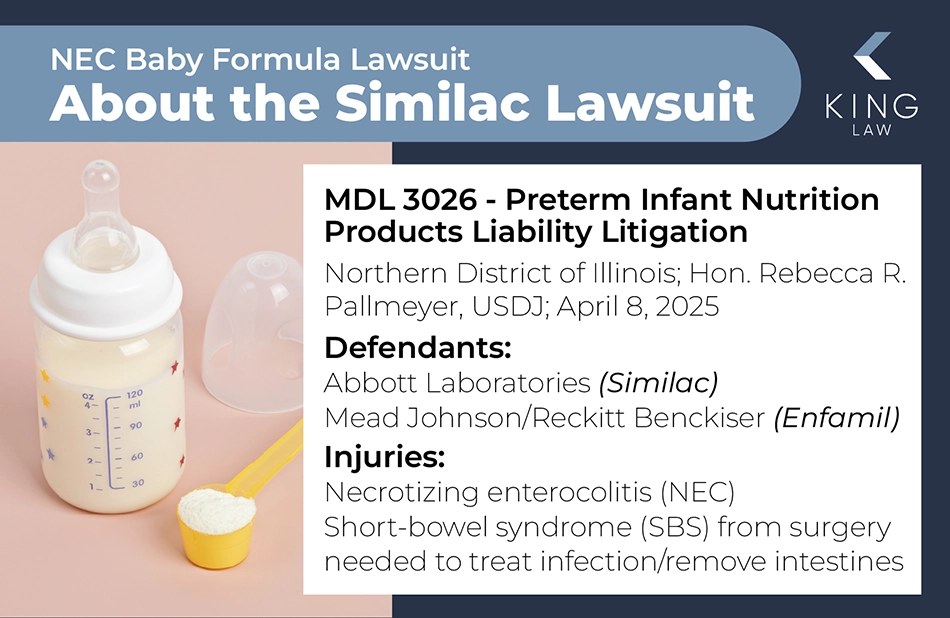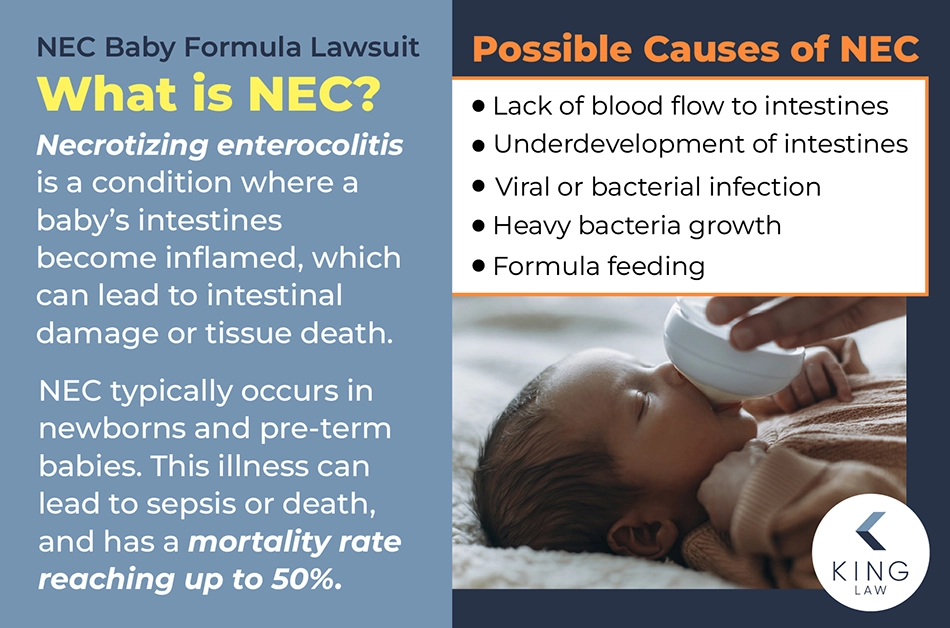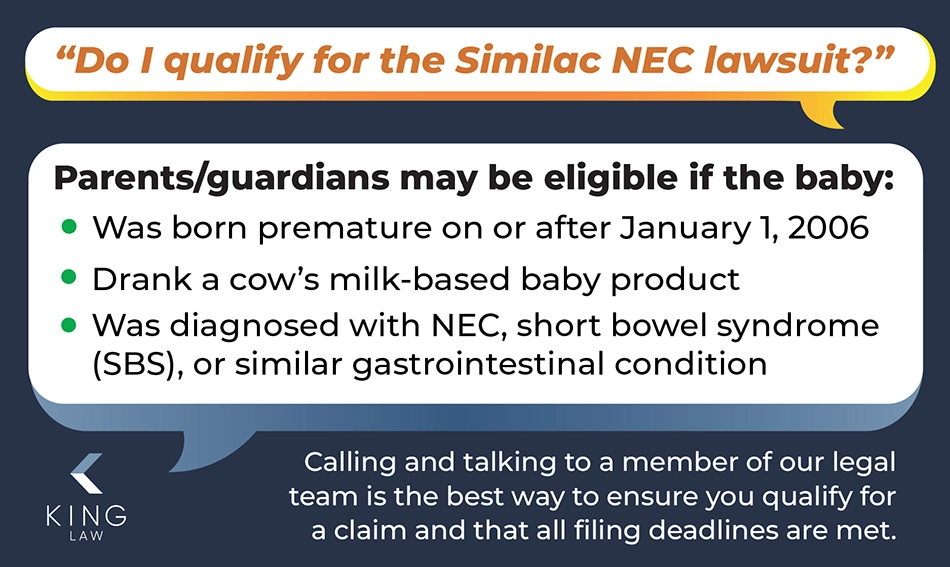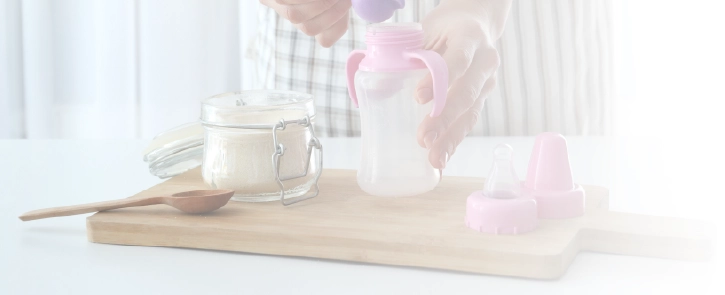Complete the form below to see if you qualify for a NEC Baby Formula Lawsuit

Lawsuits filed against the makers of Similac accuse the manufacturer (Abbott Laboratories) of making formulas that can be dangerous to preterm infants. Similac formulas made for preterm babies contain cow’s milk, which can make an infant 6 to 10 times more likely to develop necrotizing enterocolitis (NEC).
These lawsuits accuse Abbott Laboratories of not properly disclosing the potential dangerous side effects of its preterm baby formulas and preterm infant nutrition products.
Many infants lost their lives or developed life-long complications because of NEC from Similac. Preterm infant injuries were so frequent that a group lawsuit was formed (i.e., MDL-3026 IN RE: Abbott Laboratories, et al., Preterm Infant Nutrition Products Liability Litigation).
Parents suffered unimaginable losses after their babies were fed Similac products. In an effort to gain compensation for these losses, parents are filing Similac lawsuits.
Similac Lawsuit Updates [December 2025]
December 3, 2025: New Possible Treatment Emerges for NEC
About 2 to 5% of preterm babies born in the U.S. are diagnosed with necrotizing enterocolitis (NEC) each year. The intestinal disease can be fatal and cause lifelong complications. It is associated with proteins in formulas made with cow’s milk, including Enfamil’s products. Now, a study published in the journal Nature investigated a possible new treatment for NEC. The stem-cell treatment was given to mice who had NEC and it improved outcomes for the subjects. This treatment may also prove effective in human babies, though more research will be needed.
November 5, 2025: Another Bellwether Trial Found in Favor of Abbott
Many parents whose children were diagnosed with necrotizing enterocolitis (NEC) have joined a federal group lawsuit. In the third bellwether (test) trial, the maker of Similac was found not liable for an infant’s death. The jury found that although Similac nutrition products made from cow’s milk may have caused NEC in the baby, there was no other viable nutrition option. In order to win a product liability lawsuit, like one against formula manufacturers, the plaintiffs’ lawyers have to prove that the harm outweighs the benefits of the product. People who are part of this group lawsuit are hopeful for different outcomes in upcoming trials.
October 17, 2025: Similac’s Abbott Under Fire for Necrotizing Enterocolitis and Deceptive Marketing Practices
Parents continue to look to the courts after their babies suffer from necrotizing enterocolitis after drinking Similac infant formula products. Medical evidence shows that Similac and other brands of cow’s milk-based fortifiers and formulas ramp up a child’s risk of developing NEC, which can be fatal. Meanwhile, Abbott also faces legal scrutiny over how it markets its toddler milk products. Parents believe they were misled into thinking that special toddler milk is necessary and healthy for their children when it is not.
October 3, 2025: More Parents Sue Similac Over Necrotizing Enterocolitis Cases, Abbott Under Fire for Unsanitary Conditions
Hundreds of parents are suing Abbott, the company that manufactures Similac, because their baby developed necrotizing enterocolitis after being fed Similac in the hospital. A robust body of medical research shows that babies who are fed cow’s milk-based formula (like Similac) have a higher chance of developing this life-threatening condition. These lawsuits are active and ongoing. Meanwhile, Abbott also faces accusations over unsanitary conditions at its Michigan plant, with workers citing multiple unsafe and unhygienic practices occurring at that facility.
September 17, 2025: Similac’s Abbott Faces More Necrotizing Enterocolitis Legal Claims
Abbott, which makes the Similac brand of formula, is under legal scrutiny because of the link between Similac and necrotizing enterocolitis in preterm infants. Hundreds of infants have become ill, acquired a disability, or died due to complications from necrotizing enterocolitis while in the hospital. Many parents believe cow’s milk-based formulas like Similac are the cause, and they have medical studies and expert opinions to support their beliefs. The number of NEC claims against Similac’s Abbott and its competitor has reached 760 pending claims, and the count is expected to grow.
September 3, 2025: Judge Dismisses Similac NEC Lawsuit Before Trial
U.S. District Judge, Rebecca Pallmeyer, has dismissed an important trial in the NEC group litigation. On August 11, 2025, a bellwether (test) trial was supposed to begin. The judge dismissed this lawsuit on the grounds that expert testimonies provided by the plaintiff’s lawyers were not strong enough to support the claim that Similac caused NEC in the plaintiff’s infant child. Although this is not good news for the family or plaintiffs, other test trials are scheduled in 2026. Families whose infants were diagnosed with NEC should speak to an attorney to determine their best filing options.
August 1, 2025: Necrotizing Enterocolitis MDL Judge Seeks Accounting of All NEC Claims Against Similac’s Abbott
The MDL judge has requested information about the claims in the multidistrict litigation against Similac’s Abbott. In the court order, the judge noted that this request is made to help the judge decide how best to efficiently move the cases against Abbott forward. The court has asked for an accounting of all the claims pending against Abbott, even those that are not part of the federal group claim. Parents whose children developed NEC after consuming Similac formula and nutrition products can still file lawsuits.
July 18, 2925: Similac’s Abbott Faces Heavy Metal Lawsuits as Necrotizing Enterocolitis Cases Rise
Abbott is facing multiple legal actions because of problems with its Similac formula products. One class of cases is being filed by parents of preterm infants whose newborns died or suffered complications after Similac’s formula caused them to develop necrotizing enterocolitis. Abbott is also facing a class action because the heavy metal content in its Similac formula is too high and is making babies develop autism, ADHD, and other neurodevelopmental disorders.
July 2, 2025: Similac Necrotizing Enterocolitis Lawsuit Gains Momentum as Trial Preparations Continue
Parents are closer to obtaining justice in their lawsuits against Abbott Laboratories. They claim that Abbott’s Similac formula is the reason their preterm babies developed NEC (necrotizing enterocolitis) while in the hospital. As support, they have cited numerous studies that show an established link between baby formula and this devastating complication. Now, preparations are in full force as several parents’ cases move towards a Bellwether trial.
June 17, 2025: New Test for NEC Could Improve Survival Rates
As many as 1 million babies die each year from necrotizing enterocolitis or NEC. This condition is most common in preterm infants who have been fed cow’s-milk-based formula products made by Similac and others. Now, researchers at MIT have developed a new testing device to diagnose NEC. The (BLIPI) system, developed by researchers at MIT, promises near-real-time results and requires much less blood from the newborn to diagnose NEC and other types of inflammation. This device could lead to earlier interventions and lives saved.
June 3, 2025: RFK Jr. Orders an FDA Review of Ingredients in Similac and Other Infant Formulas
As part of Health Secretary Robert F. Kennedy Jr.’s “Make America Healthy Again” initiative, he has ordered the FDA to review all of the ingredients in baby formula products sold in the United States, including all Similac products. The review will be called “Operation Stork Speed.” Although the health secretary says current formulas are safe for babies, he said regulatory updates may be necessary to improve the formulas sold in the U.S. This announcement comes as certain ingredients in formulas are associated with NEC, a potentially lethal intestinal condition in preterm babies. Many parents have filed lawsuits against Similac and other manufacturers for multiple alleged failures.
May 20, 2025: Similac NEC MDL Grows to Over 700
As of May 1, 2025, the Similac lawsuit has 710 active cases. This is the multidistrict litigation against Abbott Laboratories, Mead Johnson, Reckitt Benckiser, and other formula manufacturers. Hundreds of parents have sued companies like Abbott because they believe Similac and other cow’s milk-based formulas caused their babies to develop necrotizing enterocolitis. This condition can be fatal, and formula feeding has been identified as a risk factor. Parents believe they were not warned about the dangers of Similac, and they are seeking answers and compensation.
May 2, 2025: Similac Judge Says Experts Can Testify that Formula Can Cause Necrotizing Enterocolitis
The judge overseeing the Similac multidistrict litigation has said she will allow experts to testify that cow’s milk-based formula can cause necrotizing enterocolitis. The medical community has been investigating the underlying causes of necrotizing enterocolitis for decades. Formula feeding is known to be associated with this condition, especially cow’s milk-based formulas like Similac. Plaintiffs can use expert testimony to help boost their claims against Abbott and other companies.
March 14, 2025: Judge Says Family Can Have a Retrial in Their Similac Lawsuit
Kaine Whitfield’s family will get to retry their Similac lawsuit, according to an order issued by a Missouri Judge. Kaine developed necrotizing enterocolitis after being fed Similac, Enfamil, and other cow’s milk-based formulas in the hospital. While he survived, he has severe and lifelong medical challenges. The jury had previously delivered a win to Abbott, Mead Johnson, and Reckitt Benckiser. However, on appeal, this decision was overturned because of significant errors by the attorneys representing Abbott and the other infant formula companies. As a result, Kaine and his family hope this new trial will result in them receiving a fair compensation package.
February 24, 2025: Family in Arizona Sues Similac Maker Abbott Over Death of Baby
Marina and Shen Seiken of Arizona filed a legal complaint against Abbott, the company that manufactures Similac. Marina and Shen’s infant, K.S., was fed Similac Special Care formula shortly after being born prematurely. K.S. developed serious intestinal issues, including a swollen belly and green stool, and was diagnosed with necrotizing enterocolitis. Tragically, K.S. passed away after multiple attempts to save their life. The Seikens blame the cow’s milk-based formula, Similac, for causing their baby to develop this fatal condition.
July 26, 2024: Abbott Must Pay $495 Million Verdict in Similac Lawsuit in Missouri
A jury has ordered Abbott to pay $495 million to Margo Gill and her family because of the harm that Similac products inflicted on her baby. Margo’s baby, Robynn, developed necrotizing enterocolitis and had to have multiple surgeries to correct it. As a result, she suffered permanent neurological damage and will require lifelong care. Margo believed that Similac formula is to blame, and the jury agreed with her.
About the Similac Lawsuit:
What Is the Similac Lawsuit About?
What Is NEC From Similac Baby Formula?
Similac Ingredients That Cause Preterm Babies To Develop NEC
What Are the Symptoms of NEC From Similac Formula?
Studies Connecting Similac to NEC in Preemie Babies
Similac Maker’s Response to NEC Baby Formula Lawsuits
Other Legal Actions Involving Similac and Abbott Laboratories
Who Can File a Similac NEC Lawsuit?
What Are the Steps in a Similac Lawsuit?
Filing Deadline for a Similac Lawsuit
Settlements and Payout Estimates for Similac Lawsuits
What Is the Similac Lawsuit About?
The Similac lawsuit is for parents whose preterm babies developed necrotizing enterocolitis (NEC) after being fed Similac formulas and infant nutrition products. These products do not carry a warning about increasing an infant’s chance of developing NEC. So, parents, concerned guardians, and others are suing Abbott Laboratories for not properly warning parents and healthcare providers.
NEC is a potentially life-threatening condition that can cause sepsis, difficulty breathing, intestinal tissue death, and other serious complications. Growing evidence shows that cow’s milk-based formulas, like Similac, greatly increase a baby’s likelihood of NEC. Many people believe Abbott Laboratories knows about this risk but chooses not to properly warn parents or the medical community. People are suing Abbott Laboratories to hold the company accountable for its actions and seek vital compensation for their losses.

Named Similac Baby Formulas in the NEC Lawsuit
Many different cow’s milk-based Similac formulas have allegedly caused necrotizing enterocolitis. Some of the Similac formulas involved in the lawsuit include the following:
- Similac 360 Total Care
- Similac Alimentum
- Similac Go & Grow
- Similac Human Milk Fortifier
- Similac Liquid Protein Fortifier
- Similac NeoSure
- Similac Special Care
- Similac Special Care 20
- Similac Special Care 24
- Similac Special Care 30
A number of Similac formulas were made specifically for premature babies and are included in the feeding protocol when the baby cannot have enough of their mother’s milk to support them. However, parents believe this approach has unnecessarily put preterm babies at risk of severe complications and possibly death. Research dating back to the 1990s shows a connection between cow’s milk-based formula and a baby having necrotizing enterocolitis.
What Is NEC From Similac Baby Formula?
Necrotizing enterocolitis is a serious medical issue that causes inflammation and infection in a baby’s intestines. This illness has a mortality rate of up to 50 percent and can lead to sepsis and death. Babies who have necrotizing enterocolitis may have a swollen, painful, or discolored belly, difficulty breathing, or a tear in their intestines or colon. They may need surgery to remove the dead intestines or address other symptoms.
Necrotizing enterocolitis primarily impacts premature or at-risk full-term babies in their first few weeks after birth. Medical research shows that formula feeding is one of the known risk factors of a baby developing necrotizing enterocolitis. Specifically, cow’s milk-based formulas, like Similac, are known to be associated with this illness because their ingredients and concentration levels can irritate a newborn’s system.

How Does Similac Cause NEC?
Medical professionals are still discovering how babies get necrotizing enterocolitis. However, they have confirmed that preterm babies fed formulas made from cow’s milk have necrotizing enterocolitis at a much higher rate than their breast-milk-fed peers. Scientists believe that one reason for this is the types and amounts of proteins, additives, and ingredients in Similac, Enfamil, and other formulas.
Formulas made from cow’s milk have more casein and whey proteins in them compared to human milk. These proteins can be harder for a small baby’s system to digest, which can lead to inflammation, bowel perforation, and the death of intestinal tissue. Additionally, one study found that the unbound free fatty acids left over in digested formula may be one driver of necrotizing enterocolitis. The authors found that digested human milk did not have these same levels of unbound free fatty acids.
Similac Ingredients That Cause Preterm Babies To Develop NEC
Some problematic ingredients in Similac’s cow’s milk-based formulas include:
- Casein
- Additives
- Whey protein
Some of these materials appear in much higher quantities in Similac’s formulas than they do in human milk. Additionally, the ratio of formula to water can pose issues for the development of a baby’s gut and gut barrier. Likewise, Similac does not have the same natural protective bacteria that is present in breast milk that can encourage a healthy, well-functioning gut. The combination of these factors can overwhelm a premature infant’s digestive system and cause them to develop necrotizing enterocolitis.
What Are the Symptoms of NEC From Similac Formula?
A baby being fed Similac products is more likely to experience necrotizing enterocolitis within the first two to six weeks of life. Signs of necrotizing enterocolitis include the following:
- A distended (swollen) belly
- Inability to keep the formula down
- Vomiting that has bile in it (has a green appearance)
- Runny stools that are bloody, black, or discolored
- Trouble breathing
- A dangerous temperature or heart rate
A baby who was fed Similac or another cow’s milk-based formula and develops these urgent symptoms should receive treatment right away. Medical intervention might include switching to breast milk, giving the baby antibiotics, or performing surgery.
Studies Connecting Similac to NEC in Preemie Babies
Many studies have shown a link between formula, like Similac, and a preterm baby developing necrotizing enterocolitis. These studies date back to 1990, and many people believe Abbott should disclose more and better information to parents and healthcare providers.
Effect of Various Preterm Infant Milk Formulas on NEC-Like Gut Injury in Mice
Effect of Various Preterm Infant Milk Formulas on NEC-Like Gut Injury in Mice explored how different premature infant formulas impacted the guts of mice. The hope was to understand if some types of formulas have an increased chance of causing necrotizing enterocolitis than others and why. The authors looked at Similac Special Care, NeoSure, and EleCare. The researchers found that Similac Special Care and EleCare caused “significant intestinal injury” compared to the control group.
Breast milk and neonatal necrotising enterocolitis
The UK study, Breast milk and neonatal necrotising enterocolitis, examined the rates of necrotizing enterocolitis among formula-fed versus breast milk-fed preterm infants. The research article discovered that preterm babies fed exclusively formula developed necrotizing enterocolitis 6 to 10 times more often than those fed breast milk.
Formula-fed preemies were three times more likely to have necrotizing enterocolitis than those fed a mixture of breast milk and formula. Startlingly, babies born at more than 30 weeks gestation and who were fed only formula were 20 times more at risk of necrotizing enterocolitis than those same-aged babies who were given just breast milk.
Digested formula but not digested fresh human milk causes death of intestinal cells in vitro: implications for necrotizing enterocolitis
Digested formula but not digested fresh human milk causes death of intestinal cells in vitro: implications for necrotizing enterocolitis investigated factors that may make formula more likely to cause necrotizing enterocolitis than breast milk. Based on their results, the authors believe unbound free fatty acids left over in the digested formula may be the culprit.
These substances can cause the baby’s intestinal tissue to die, which is part of what happens when a baby has necrotizing enterocolitis. This groundbreaking study, published in 2013, sheds important light on the chain of events that can lead to this often life-threatening disease.
Similac Maker’s Response to NEC Baby Formula Lawsuits
Abbott Laboratories, which manufactures Similac, consistently denies that it should be held legally liable for infants’ injuries. The company claims that it is the absence of breast milk, not the feeding of formula, that is the cause of NEC in preterm infants.
Abbott continues to claim that its products are vital as part of a well-rounded protocol for premature infants. Additionally, Abbott’s advocates say the risk of not giving a baby formula is far greater than any claimed risk of feeding them formula. Abbott continues to defend itself and attack the growing body of research that shows cow’s milk-based Similac can cause necrotizing enterocolitis.
Other Legal Actions Involving Similac and Abbott Laboratories
The current Similac NEC lawsuits are not the only time Abbott Laboratories has faced legal and regulatory scrutiny. In February 2022, the company recalled multiple lots of its Similac, EleCare, and Alimentum formulas. These products were manufactured at Abbott’s facility in Sturgis, Michigan, and were contaminated with the deadly Cronobacter sakazakii bacteria. Abbott has since reopened its Sturgis facility after taking steps to clear the contamination. In October 2022, Abbott also recalled several batches of liquid infant products because some of the bottles may not have been sealed completely, so they could become spoiled and make babies sick.
Who Can File a Similac NEC Lawsuit?
Parents and guardians may file a claim against Abbott if their infant was fed Similac and suffered from necrotizing enterocolitis or a similar intestinal issue. Some of the other eligibility criteria include the following:
- The baby was born on or after January 1, 2006
- The newborn was premature
- The infant drank a cow’s milk-based product
- The baby was diagnosed with necrotizing enterocolitis, short bowel syndrome, or a similar gastrointestinal condition
Medical providers do not always tell parents what type of formula they are feeding the baby. Because of this, parents may still have a Similac claim even if they do not know if their baby was given a cow’s milk-based product. Parents are encouraged to contact a lawyer who can help them determine what happened in their situation. Our team has experience navigating NEC formula lawsuits, and we will help you gather the information needed to file a case.

What Are the Steps in a Similac Lawsuit?
Parents who believe they are eligible for a settlement because of what happened to their newborn may be able to sue Similac’s manufacturer, Abbott. Steps involved in taking legal action against Abbott include the following:
- Step 1: Contact our law firm to get a free case evaluation.
- Step 2: If you are eligible to file a lawsuit, review and sign the paperwork to retain your attorney.
- Step 3: Work with your attorney’s team to gather medical records, showing your baby was fed Similac, and documentation of their NEC, treatment, and implications..
- Step 4: Provide additional information for your attorney to file a legal complaint in the appropriate court.
- Step 5: Progress through the legal process and move toward a settlement.
Many parents who choose to file a Similac lawsuit will join the multidistrict litigation against Abbott Laboratories and other formula manufacturers (MDL-3026 IN RE: Abbott Laboratories, et al., Preterm Infant Nutrition Products Liability Litigation). This litigation is centralized in Illinois federal courts under the Honorable Rebecca R. Pallmeyer. Joining this litigation offers several benefits to plaintiffs (parents) and can decrease filing burdens.
King Law is accepting Similac cases and is prepared to help with all steps in the process. We are ready to fight for you and your family and seek justice.
Filing Deadline for a Similac Lawsuit
Parents need to file a Similac claim prior to the statute of limitations (deadline) expiring. These due dates can fall a couple of years after the injury occurs or is discovered. However, some state laws allow people to bring a case several years after the infant turns 18. That said, filing sooner can help strengthen the person’s case and make sure evidence is not lost or spoiled with time. People who are interested in filing a Similac lawsuit should contact a qualified attorney to determine how quickly a case needs to be filed.
Settlements and Payout Estimates for Similac Lawsuits
Some parents who sue Abbott may receive a settlement of up to $45,000 to $600,000 or more if their baby was injured after consuming Similac formula. However, the exact amount they receive is determined based on the facts at play in their specific case. Some of the factors that can affect the total value of parents’ settlement include the severity of their baby’s complications after eating Similac’s cow’s milk-based formula, whether or not the infant survived, the implications of life-long side effects, and the total medical care costs.
Contact a Similac NEC Baby Formula Lawyer Today
You may be entitled to compensation if your baby was fed Similac or another cow’s milk-based formula and developed a condition such as necrotizing enterocolitis. Many believe that Abbott Laboratories knew about the serious risks these cow’s milk-based products posed to infants, but they failed to warn the public about them.
King Law has vast experience helping clients stand up against huge companies like Abbott that prioritize financial interests over the safety of children and newborns. We are prepared to talk to you about your situation and develop a case strategy to help you pursue a fair settlement. Call (585) 496-2648 or fill out our online contact form to schedule a free case evaluation.

